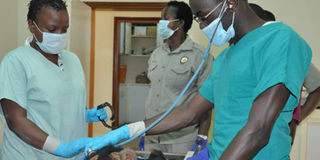Primates undergo health checks for zoonotic diseases

Check-up. A primate undergoes health examination at Uganda Wildlife Education Centre in Entebbe. PHOTO BY ERIC NTALUMBWA
What you need to know:
The primates often suffer from respiratory tract infections such as cough and flu which progress into pneumonia, especially among infants.
Primates at Uganda Wildlife Education Centre (Uwec) have started receiving specialised health examinations in an exercise that will end next week.
The primates often suffer from respiratory tract infections such as cough and flu which progress into pneumonia, especially among infants.
A team of 15 comprising veterinarians, zoo keepers, laboratory technicians, and exchange veterinary students are performing the health examinations.
The Uwec veterinary officer, Dr Julius Kyaligonza, says: “The animals in our care go beyond food and shelter. They have a medical programme where, depending on the facilitation, once or twice in a year, we assess their health. We go into an animal’s life to look out for indicators that can lead to a condition or disease. We check blood chemistry, cell blood count, serum, faecal matter to look out for internal parasites, skin, body conditions, external parasites and general condition of the animal. What we are doing is for management and safety.”
The Entebbe Zoo is performing the health checks with support from the Jane Goodall Institute and Chimpanzee Sanctuary.
The two conservation agencies have donated some equipment and drugs because it is a costly exercise for the centre to undertake alone.
The Uwec executive director, Dr James Musinguzi, says they face the challenge of inadequate funding, because it is a stand-alone centre in the region. “Uwec is the coordinating zoo for all zoos in East and Central Africa, in other words for benchmarking and learning, we can only go to either South Africa, North America or Europe. So that makes our work expensive. The drugs are imported and it is not cheap. We also have to send staff abroad because there is no other facility in the region that offers this kind of service.”
Dr Titus Mukungu, the Chimpanzee Trust veterinary officer, says they have began with monkeys and chimpanzees in the quarantine.
“They come from the wild while malnourished and after some time, they are integrated into the primate groups at the zoo. The primates are close to humans in terms of DNA so they have zoonotic diseases that can easily be transmitted to human in case they bit or scratch you. Nevertheless, we are vaccinated against various diseases..,” he says.
Previously, a community of chimpanzees in Kibale National Park faced an outbreak of respiratory disease.


